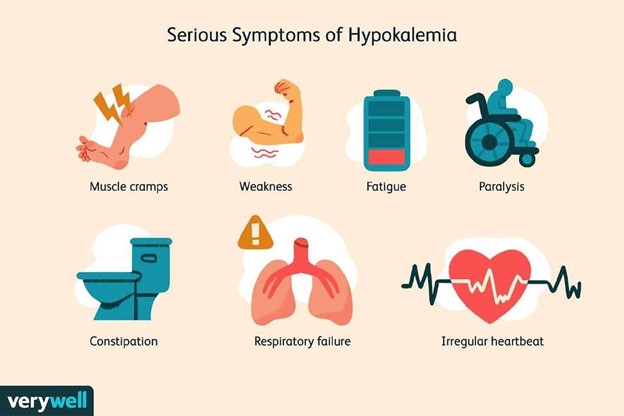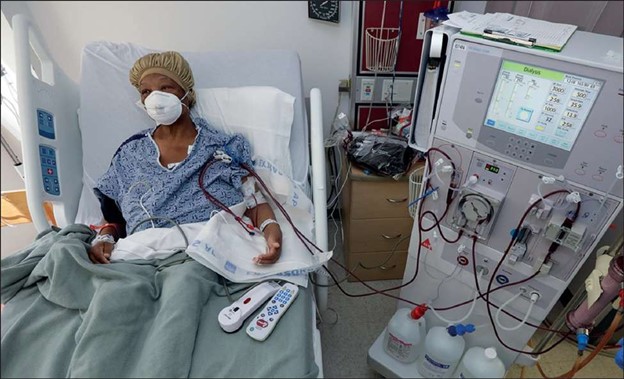A client is admitted with dehydration and hypokalemia.
Which of the following signs and symptoms would the nurse expect to find (Select all that apply).
Muscle weakness.
Constipation.
Hyperreflexia.
Cardiac dysrhythmias.
Nausea and vomiting.
Correct Answer : A,B,D

These are all signs and symptoms of hypokalemia, which is a condition where the blood potassium level is too low. This can affect the function of the muscles, nerves, and heart. Therefore, the nurse would expect to find these signs and symptoms in a client with dehydration and hypokalemia.
Choice C is wrong because hyperreflexia is not a sign or symptom of hypokalemia.
Hyperreflexia is a condition where the reflexes are exaggerated or overactive.
This can be caused by conditions such as spinal cord injury, stroke, or electrolyte imbalances such as hypocalcemia or hypomagnesemia.
Nursing Test Bank
Naxlex Comprehensive Predictor Exams
Related Questions
Correct Answer is C
Explanation
This is because intravenous potassium supplementation is indicated for patients with profound hypokalemia (plasma K+ <2.5 mmol/L) or cardiac arrhythmia. The rate of infusion should not exceed 10 mmol/hour to prevent complications such as hyperkalemia, cardiac arrhythmias, and phlebitis.
Choice A is wrong because monitoring urine output every 8 hours is not sufficient to prevent complications from intravenous potassium replacement therapy.
Urine output should be monitored more frequently (at least every 4 hours) to assess renal function and fluid balance.
Choice B is wrong because administering potassium via a bolus injection is dangerous and can cause fatal cardiac arrhythmias.
Potassium should never be given by intravenous push or intramuscular injection.
Choice D is wrong because encouraging the client to eat potassium-rich foods is not appropriate for patients receiving intravenous potassium replacement therapy.
Oral potassium supplementation is preferred for patients with mild to moderate hypokalemia (plasma K+ 2.5-3.5 mmol/L) who can eat and absorb oral potassium.
Potassium-rich foods include potatoes, legumes, juices, seafood, leafy greens, dairy, tomatoes and bananas.
Correct Answer is A
Explanation

This is because hemodialysis removes excess fluid and waste products from the blood, but it also removes some electrolytes, such as potassium.
Potassium is important for nerve and muscle function, especially the heart.
If potassium levels are too high or too low, it can cause irregular heartbeat or cardiac arrest.
Choice B is wrong because hypokalemia means low potassium levels, which is unlikely in renal failure unless there is excessive potassium loss from diarrhea, vomiting or diuretics.
Choice C is wrong because hyponatremia means low sodium levels, which can occur in renal failure due to fluid retention, but it is not directly related to hemodialysis.
Choice D is wrong because hypernatremia means high sodium levels, which can occur in renal failure due to reduced urine output, but it is also not directly related to hemodialysis.
Normal ranges for electrolytes are: Potassium: 3.5 to 5.0 mmol/L
Sodium: 135 to 145 mmol/L
Calcium: 8.5 to 10.5 mg/dL
Chloride: 96 to 106 mmol/L
Magnesium: 1.7 to 2.2 mg/dL
Phosphate: 2.5 to 4.5 mg/dL
Bicarbonate: 22 to 29 mmol/L
Whether you are a student looking to ace your exams or a practicing nurse seeking to enhance your expertise , our nursing education contents will empower you with the confidence and competence to make a difference in the lives of patients and become a respected leader in the healthcare field.
Visit Naxlex, invest in your future and unlock endless possibilities with our unparalleled nursing education contents today
Report Wrong Answer on the Current Question
Do you disagree with the answer? If yes, what is your expected answer? Explain.
Kindly be descriptive with the issue you are facing.
